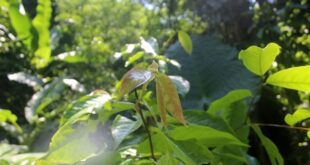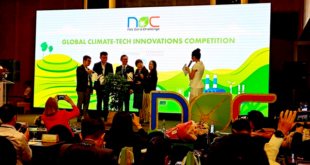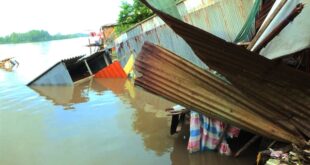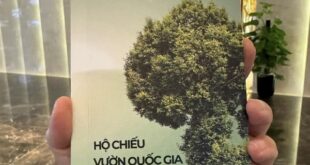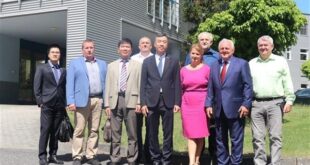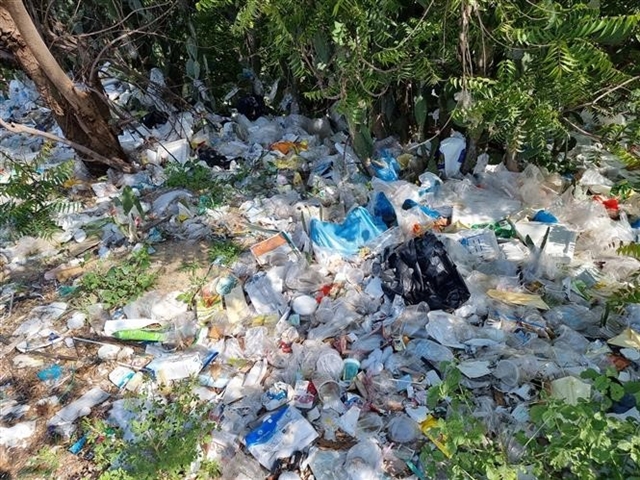 |
| Plastic waste in An Hải Commune, Ninh Phước District in the coastal central province of Ninh Thuận.— VNA/VNS Photo Nguyễn Thành |
HÀ NỘI — Extended Producer Responsibility is a new policy approach to deal with wastes, promote recycling and help the Government to achieve its environmental goals.
Phan Tuấn Hùng, director of the National Extended Producer Responsibility Council Office, said if properly and fully implemented EPR would ensure the circulation of resources between the input and waste stages in the production process and help achieve the goal of no emissions.
“No matter what form of recycling a manufacturing enterprise chooses, cash will flow to businesses that collect and recycle waste,” Hùng was quoted by Vietnam News Agency’s Tin Tức (News) newspaper as saying.
But only advanced and modern recycling technologies that meet environmental standards would benefit from the EPR policy, he stressed.
Small recyclers who struggle to acquire advanced technologies should join hands, he added.
This is the first year of EPR implementation in Việt Nam, and the hope is to create a change in the process of promoting the circular economy.
Local manufacturers and importers have embraced EPR quite early.
In 2021 nine enterprises, TH Group, Coca-Cola, FrieslandCampina, La Vie, Nestle, Nutifood, Suntory PepsiCo, Tetra Pak, and Universal Robina Corporation established the Packaging Recycling Organisation Việt Nam.
Its mission is to develop a strong packaging collection and recycling eco-system that helps increase recycling rates and minimise the rate of packaging discharged into the environment.
It has helped raise consumer awareness about recycling and waste classification and strengthen the existing packaging collection eco-system.
It has also supported the recycling programmes of treatment plants and factories that produce recycled materials.
In addition to the organisation’s efforts, its members have also actively responded and signed co-operation agreements with recyclers.
Suntory PepsiCo Việt Nam Beverage and DUYTAN Plastic Recycling signed a strategic agreement for the supply of recycled plastic to the former to make packaging for its products in 2022-26.
In October 2023 La Vie Limited Liability Company signed a memorandum of understanding for a waste-plastic collection and recycling co-operation programme with DUYTAN Plastic Recycling.
Under the five-year programme the two have a target of collecting and recycling 11,000 tonnes of plastic waste.
In November FrieslandCampina Việt Nam signed an agreement with Đồng Tiến Bình Dương Paper Company Limited and Trường Thịnh Mechanical Construction Company Limited to improve its waste-packaging collection and recycling capacity.
Many Vietnamese businesses are also seeking to invest in recycling plants.
DUYTAN Plastic Recycling has invested US$60 million in a plastic recycling plant that used Bottle to Bottle technology. The technology allows plastic to be recycled up to 50 times.
The factory is now among the five most modern and largest that recycle plastic in the world.
It has a capacity of 40,000 tonnes a year.
Vietcycle Corporation and ALBA Group have established a 48,000-tonne recycling plant at a cost of $50 million. It uses technology from Germany to recycle and create rPET plastic that meets international standards. It is the first in the north to recycle and make food-grade plastic.
New point
EPR is enshrined in the 2020 Law on Environmental Protection.
In addition to the goal of increasing reuse, recycling and minimising waste, EPR will change manufacturers and consumers’ habits, increase the use of environment-friendly materials, reduce plastic waste, and help achieve a circular economy.
Its Article 54 stipulates that manufacturers and importers are responsible for recycling products and packaging.
Manufacturers and importers of six groups of products and packaging – tires and tubes, batteries and accumulators, lubricants, packaged products (such as food, cosmetics, drugs, fertilisers, animal feed, veterinary drugs, cement, detergents and preparations for household, agricultural and medical use), electricity and electronics, and vehicles — are responsible for recycling products and packaging based on the mandatory recycling rate and recycling specifications.
They have the option instead of paying the Việt Nam Environmental Protection Fund to recycle their products.
Their deadlines are staggered between 2024 and 2027.
Manufacturers and importers of six other groups of products and packaging - plant protection drugs, disposable batteries, nappies, sanitary napkins, disposable wet wipes, chewing gum, cigarettes, and certain products and goods containing synthetic plastic ingredients – have been paying the fund for recycling since 2022. — VNS
- Reduce Hair Loss with PURA D’OR Gold Label Shampoo
- Castor Oil Has Made a “Huge” Difference With Hair and Brow Growth
- Excessive hair loss in men: Signs of illness that cannot be subjective
- Dịch Vụ SEO Website ở Los Angeles, CA: đưa trang web doanh nghiệp bạn lên top Google
- Nails Salon Sierra Madre
 VnExpress News The News Gateway of Vietnam
VnExpress News The News Gateway of Vietnam
